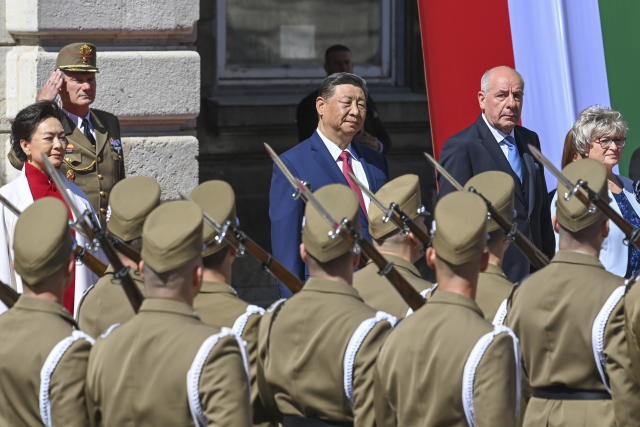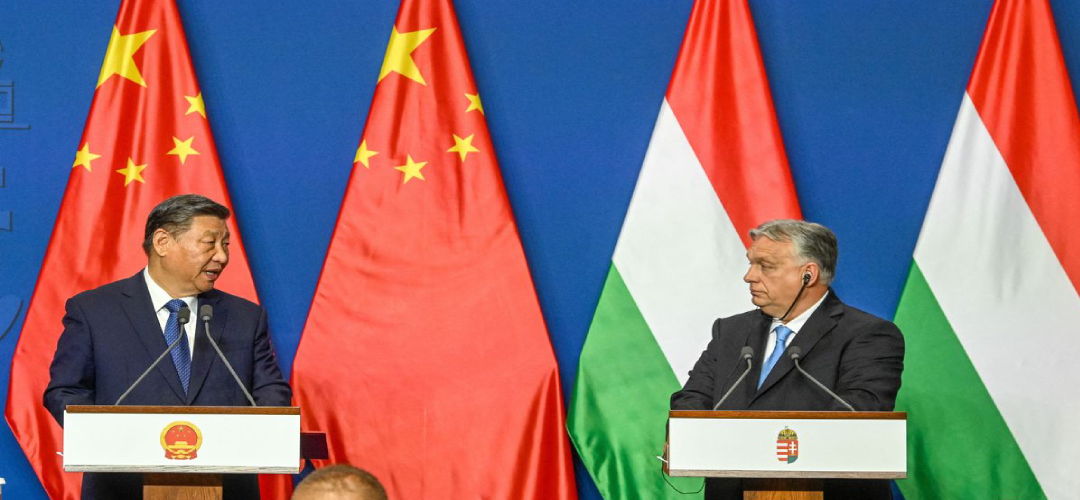A strategy of Divide-and-Charm?
“Welcome to Hungary, President Xi,” Hungary’s President Orbán posted on X, underlining the importance China enjoys in some of NATO’s members despite the ongoing tensions around Ukraine.
China’s President Xi Jinping is visiting the European Union for the first time in five years. This is a critical visit under the overhang of China, drawing closer to Moscow since the Russian invasion of Ukraine.
The EU’s toughened stance will affect his visit to Paris, but he will also be greeted by a more friendly atmosphere in the second phase of his tour in Belgrade and Budapest, which are known for their close economic ties with Beijing.
French President Emmanuel Macron spoke of the risks of supporting Russia in its invasion of Ukraine. The West has blamed Chinese weapons supply lines as critical to Russia’s war sustainability. In recognition of the influence that China carries over Moscow and its war efforts, President Macron has correctly seen Europe’s keenest to get China to weigh in on the side of “stability of the international order,” in other words, meaning Beijing should stop buttressing Moscow’s war-making capacity. In fact, China could inexorably tip the scales in favour of Russia.
Background
Despite efforts from Paris to address EU-China trade, Emmanuel Lincot, a researcher at the Catholic Institute of Paris, believes that Beijing’s immovability is evident. According to Eurostat data, European Union (EU) member states are vulnerable to China’s influence, with a trade deficit of $314.72 billion in goods with China in 2023. The EU’s 27 members face job threats from low-cost exports and overcapacity issues, highlighting the need for tough decisions to protect its economy and security. “Europe will not waver from making tough decisions needed to protect its economy and security,” Von Der Leyen said. Not surprisingly, trade and Ukraine are at the top of the agenda for talks between French President Emmanuel Macron and Chinese President Xi Jinping.
President Xi Jinping has expressed readiness to strengthen traditional friendships, boost political trust, and strengthen cooperation with France. He plans to discuss China-France and China-Europe relations under new circumstances and major global issues. This is Xi’s second state visit to France in five years, marking the 60th anniversary of diplomatic ties.
China’s President Xi Jinping has praised the friendship between China and Serbia, stating it has a strong historical foundation, political foundation, common interests, and public opinion. China is Serbia’s largest foreign investor, and economic relations have expanded since the collapse of Yugoslavia in the 1990s.
The visit to Hungary, a key ally in the EU, would be along expected lines with strengthening the relationship under Hungary’s increasingly authoritarian Prime Minister Viktor Orban. On the trade front, Hungary is the largest production hub of automotive suppliers outside mainland China, feeding the huge European market. Hungary has welcomed Chinese President Xi Jinping despite EU concerns about China’s trade, global politics, and human rights. Hungary’s president, Tamás Sulyok, has sought to deepen ties with Beijing and blocked EU motions criticizing China’s human rights abuses. China and Hungary have decided to elevate their ties to an “all-weather comprehensive strategic partnership.” This would have a familiar ring to Indians accustomed to China’s ‘all-weather’ friendship with Pakistan!
According to President Xi Jinping, China and Hungary are set to embark on a “golden voyage” in bilateral relations. Under Prime Minister Viktor Orban, Hungary has become a significant trade and investment partner for China, contrasting with other EU nations. The two countries will also move forward in constructing key projects, including reconstructing the Budapest-Belgrade railway project. The relationship, marking their 75th year of diplomatic relations, extends beyond trade and investment, with China offering cooperation on public security and law enforcement issues to Hungary.

Analysis
Discussions have been initiated in Paris to strengthen China’s position as a peacemaker. However, Beijing has yet to move the Kremlin significantly towards a European peace vision, despite efforts to use his rapport with Russian President Vladimir Putin. The U.S. and European allies are increasingly concerned about China’s exports of dual-use goods to Russia, which could deteriorate their relationship. However, there is little evidence that these messages are leading to changes in Beijing’s behaviour.
Xi’s current tour, which includes stops in France, Serbia, and Hungary, is an opportunity to appease his detractors while simultaneously demonstrating that, despite shifting opinions in some regions of Europe, others still welcome China with open arms. Beijing is eager to stifle Europe’s efforts to rectify purported trade distortions, as it coincides with a precarious period for its economy. In addition, it wishes to prevent Europe from becoming more integrated with the U.S., particularly in light of the impending U.S. election.
Hungary is seen as China’s Trojan horse in the EU. Hungary has blocked EU statements on Hong Kong, delayed EU aid for Ukraine, and sanctions on Russia. This EU disunity is useful for Beijing’s strategy of division and conquer.
China’s President Xi Jinping has warned the EU about trade protectionism and its diplomatic stance, urging EU institutions to have a correct view of China. Despite the strained relations, Xi’s European tour aims to limit damage, prevent worsening ties with Europe, and exploit divisions within Europe on Ukraine and US relations.
The visit to Belgrade had a message as it coincided with the 25th anniversary of the U.S. bombing of the Chinese Embassy in Belgrade. Despite Washington’s apology and compensation, many in China believe the embassy was deliberately targeted. China has never forgotten or forgiven this direct insult that resulted in the death of three Chinese journalists. However, Xi’s decision to skip the former embassy site, now a Chinese cultural centre, suggests a desire to avoid rekindling anti-American passions.
President Xi Jinping’s visit to Europe has domestic importance. He aims to demonstrate his status in Europe and encourage Macron’s ambition for European strategic autonomy. Xi’s vision of strategic autonomy would drive a wedge between the U.S. and Europe, demonstrating the limits of trans-Atlantic unity in China.
Assessment
- China views Europe as a key partner in diplomacy and modernisation, emphasized in a meeting with Macron and von der Leyen, urging dialogue, cooperation, and consensus building for steady growth.
- China’s President Xi Jinping’s visit to France, Serbia, and Hungary aims to divide Europe and the US, causing concerns over France’s special status and European ‘ Strategic Autonomy‘. Xi’s European tour suggests no inclination to compromise or curtail Russia’s actions.
- China needs dependable partners in Europe, especially from the EU community, to counterbalance the damaging effect of the U.S. and its crony UK. Countries like France and Hungary could act as stepping stones for enhancing Chinese influence among EU members.




